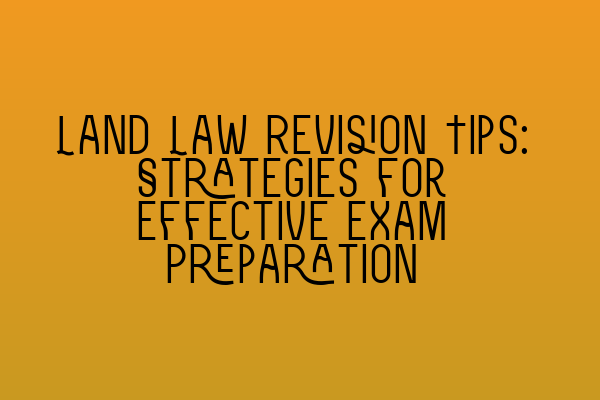Land Law Revision Tips: Strategies for Effective Exam Preparation
Land law is a complex and diverse area of study, requiring careful attention to detail and a thorough understanding of legal principles. As you prepare for your upcoming land law exam, it is crucial to have effective revision strategies in place to ensure that you are fully prepared. In this blog post, we will provide you with valuable tips and techniques to help you optimize your land law revision and achieve success in your exams.
1. Start Early and Plan Ahead
Effective land law revision starts with proper planning and organization. Begin your revision process early to allow ample time to cover all the necessary topics. Create a detailed study plan that breaks down your revision into manageable sections, ensuring that you allocate sufficient time to each topic.
Develop a revision timetable, setting specific goals for each study session. This will help you stay focused and on track, enabling you to cover all the key areas of land law before your exam date.
2. Understand the Fundamentals
Land law is built upon a foundation of fundamental principles and concepts. Before diving into the more intricate details, make sure you have a solid understanding of the core elements of land law. Familiarize yourself with terms such as freehold, leasehold, easements, covenants, and proprietary rights.
To enhance your understanding, make use of various resources such as textbooks, lecture notes, and online articles. Look for comprehensive explanations and examples to reinforce your knowledge and aid in your retention of key concepts.
3. Create Visual Aids
Visual aids can significantly enhance your understanding of land law principles and make revision more engaging. Consider creating colorful diagrams, flowcharts, and mind maps to visually represent complex concepts and interrelationships between different topics.
Visual aids can help you see the bigger picture and connect various parts of land law, aiding in comprehension and recall. Keep these visual aids easily accessible during your revision sessions for quick reference and review.
4. Test Your Knowledge
Regular self-assessment is a crucial part of effective land law revision. Testing your knowledge allows you to identify areas of weakness and focus your studies accordingly. Additionally, practicing exam-style questions will help familiarize you with the format and structure of the land law exam.
Utilize interactive SQE mock tests for land law to test your knowledge and gain confidence in your exam-taking abilities. These mock tests simulate real exam conditions and provide immediate feedback, enabling you to gauge your level of understanding and identify areas that require further revision.
5. Focus on Key Cases and Statutes
Land law is heavily influenced by key cases and statutes. Familiarize yourself with landmark cases and their implications on land law principles. Understand the reasoning behind these cases and their impact on subsequent legal developments.
Similarly, pay attention to relevant statutes and their provisions. Develop a comprehensive understanding of their application and interpretation in land law cases. Make concise summaries of key cases and statutes for easy reference during revision and in your exams.
For a more detailed analysis of legal cases and updates, you can read our related article: Contract Law Reforms: An Analysis of Recent Changes.
6. Seek Clarification
Land law can often be complex and challenging, with intricate legal principles and nuanced interpretations. If you encounter any areas of uncertainty or confusion during your revision, don’t hesitate to seek clarification from your tutors, lecturers, or fellow students.
Joining our SQE Contract Law webinars can also provide you with expert insights and guidance on specific land law topics. Take advantage of interactive discussions and Q&A sessions to clarify any doubts you may have. For more information, visit: Join Our SQE Contract Law Webinars: Expert Insights and Guidance.
7. Review and Consolidate
Regularly reviewing and consolidating your knowledge is essential for effective land law revision. Schedule regular revision sessions where you recap and reinforce previously covered topics. This will help solidify your understanding and prevent forgetting key information.
Consider revisiting previously answered questions and comparing them to model answers. Analyze any gaps in your knowledge and focus your revision on those areas. Use revision techniques such as flashcards and summaries to condense information and aid in retention.
Final Thoughts
Achieving success in your land law exam requires a strategic and disciplined approach to revision. By starting early, understanding the fundamentals, creating visual aids, testing your knowledge, focusing on key cases and statutes, seeking clarification, and reviewing regularly, you can optimize your land law revision and increase your chances of acing your exam.
For a deeper understanding of contractual capacity in relation to land law, you can read our related article: Understanding Contractual Capacity: Rights and Limitations.
Remember, effective exam preparation involves not only knowing the content but also applying your knowledge to practical scenarios. By using these revision tips and techniques, you will be well-equipped to handle any land law question that comes your way and showcase your understanding of this intricate area of law.
